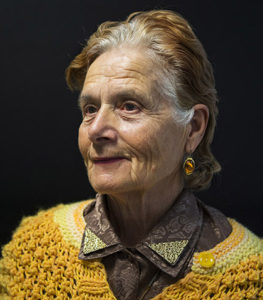Volunteers get back as much as they give – survey finds
Volunteering to help individuals and families can build skills and knowledge, enhance employment opportunities, provide new and challenging experiences as well as deliver feelings of personal satisfaction through contributing, a new survey has found.
It also delivers measurable benefits to those being supported; including help in finding work and acquiring skills as well intangible benefits such as friendship and building connections within communities, the survey found.
To mark National Volunteer Week 2019, the survey was commissioned by migrant and refugee settlement agency AMES Australia. It canvased the attitudes of 85 of the organisation’s volunteers working mostly one-on-one with newly arrived refugees and migrants.
It found that overwhelmingly, volunteers believed they, themselves, benefitted directly through helping others.
Asked whether they benefitted from their volunteering work, 32 per cent of volunteers said they benefitted ‘significantly’ and 78 per cent said they benefitted ‘somewhat’.
Among the top benefits listed were ‘a feeling of satisfaction through contributing’ (96 per cent), ‘learning about new cultures (77 per cent), ‘building social and professional networks’ (59 per cent), ‘improving personal and communication (soft) skills’ and ‘enhancing employment opportunities’ (39 per cent).
The survey also found that volunteers believed their work delivered practical and intangible benefits to those being supported.
Ninety-six per cent of volunteers said their work delivered either ‘significant’ or ‘some’ benefits to those being supported and just 4 per cent were ‘not sure’.
Among the top benefits to those being supported listed were ‘language acquisition support’ (91 per cent), ‘friendship’ (96 per cent), ‘building connections with local communities’ (68 per cent), ‘practical support in navigating life in Australia’ (53 per cent), ‘understanding how to access services’ (56 per cent) and ‘help in finding employment’ (38 per cent).
The survey found broad satisfaction with the experience of volunteering and a general feeling that it was productive.
Fifty-four per cent of volunteers were ‘very satisfied’ with the experience, while 38 per cent were ‘somewhat’ satisfied and 8 per cent were neither satisfied nor dissatisfied .
.
Sixty-nine per cent of respondents said they felt their volunteering was ‘very productive’ and 21 per cent said it was ‘somewhat productive’ while ten per cent were ‘not sure’.
Among the challenges in volunteering cited in the survey were ‘time restrictions’ (39 per cent) and ‘language barriers’ (27 per cent).
Overwhelmingly, volunteers surveyed were likely to recommend the experience to family and friends with 62 per cent saying they were ‘very likely’ to do so and 23 per cent saying they were ‘likely’ to do so. Ten per cent said they were neither likely nor unlikely to do so.
More than half (47 per cent) of the volunteers surveyed were aged between 45 and 64 and 20 per cent were aged 25 to 34.
As a migrant from Greece who arrived in Australian in 1964, Dimitra Kimakidis understands the isolation and confusion that can come with moving to a new country.
That’s why she has been volunteering with migrant and refugee settlement agency AMES Australia since 1989 helping newly arrived women refugees and migrants settle in and feel welcome.
“I enjoy volunteering to help ‘my girls’ and sometimes I can share their problems,” said Ms Kimakidis.
“It makes me happy to support people who maybe don’t have any relations or many friends here,” she said.
“When I first arrived in this country, I went through the same experience of isolation and with no family here.”
Ms Kimakidis helps Afghan women in Noble Park to learn English; and she also teaches them knitting and sewing.
“I help them with reading English and we read books together while I explain a little bit about grammar and words they might not understand,” she said.
“But sometimes, when we get bored, I teach them sewing and knitting so they can make the clothes they are used to form home and that they can’t get in Australia,” Ms Kimakidis said.
“But these woman have also become my friends and I find joy in being in their company,” she said.
Syrian refugee and volunteer Tamar Antakly said volunteering had helped introduce him to Australian society and given him connections and social and professional networks as he studies to resume his medical career in Australia.
“As well as a feeling of satisfaction in contributing to this country – which has given my family safety – I have learned a lot though volunteering; it has introduced me to life in Australia and helped me to understand how things work here,” he said.
“It’s also a good opportunity to meet people and develop networks here in Australia,” Mr Tamer said.
AMES Australia CEO Cath Scarth said the survey showed the added value volunteers can bring to an organisation.
“Our volunteers at AMES Australia do an amazing job in supporting our refugee and migrant clients and making a real difference in their lives. This gives our organisation extra reach and extra capacity,” Ms Scarth said.
“But the survey shows that volunteers also get benefits from volunteering; and not just the feel-good effect of doing something selfless but also valuable skills, experiences and knowledge,” she said.
Laurie Nowell
AMES Australia Senior Journalist












